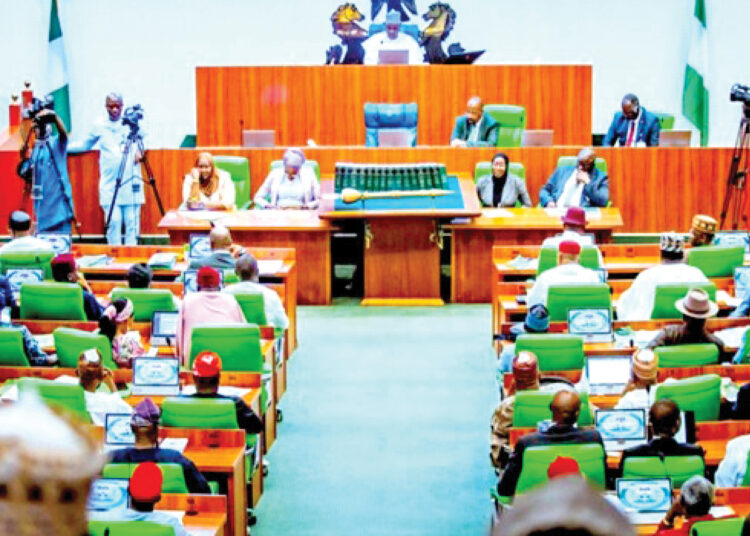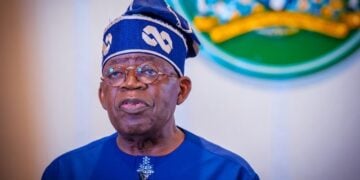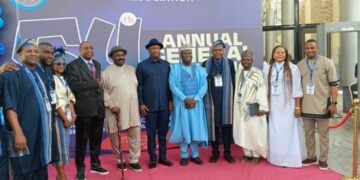Fresh debate on the establishment of state and local government police is set to resume in the country as the House of Representatives on Thursday passed through second reading a bill to that effect and 38 other proposed constitution alteration legislations.
While moves to create state police alone have always been contentious issues in the country, the proposed new law extends to local government police, so the debate would be more robust, if not fierce.
The House had in February last year passed a bill for an Act to Alter the Constitution of the Federal Republic of Nigeria, 1999 (HB.617) to create state police.
The clamour for the establishment of state police as a panacea to the country’s heightened insecurity received a major boost on Tuesday as the House of Representatives passed a Bill for an Act to Alter the Constitution of the Federal Republic of Nigeria, 1999 (HB.617) through second reading.
Sponsored by Deputy Speaker Benjamin Kalu and 14 others, the bill, which was referred to the House Committee on Constitution Review, seeks to provide for the alteration of the 1999 Constitution to provide for the establishment of State Police and the transfer of police as an item under the Exclusive-Legislative List to the Concurrent List.
Some key innovations to the proposed alteration include transferring “Police” from the “Exclusive Legislative List” to the “Concurrent Legislative List,” a move that effectively empowers states to have state-controlled policing, and introducing a comprehensive framework to ensure cohesion, accountability, and uniform standards between the Federal and State Police.
The House might have tested the waters on the establishment of state police at a one-day national dialogue on state policing with the theme, “Pathways to Peace: Reimagining Policing in Nigeria” it organised in April 2024.
At the dialogue, the Inspector General of Police, Olukayode Egbetokun, said that instead of creating a State Police structure, the Nigerian Security and Civil Defence Corps (NSCDC) and the Federal Road Safety Corps (FRSC) should be merged as a department under the Nigeria Police Force (NPF).
Egbetokun noted that if state police were established, the governors would use the structure under their control for political or personal gains, undermining human rights and security. She added that creating state police at the moment will exacerbate ethnic tension in the country.
Similarly, the Minister of Police Affairs, Senator Ibrahim Geidam, observed that while the State Police is essential for local security, it has the potential for political interference and human rights abuse.
“The establishment of state police is not without its demerits, one of them is political interference. Oversight and accountability are paramount and must be put in place to ensure that interference is reduced. An implementation roadmap is essential for successful operation,” he said during the dialogue.
The 39 bills passed in one fell swoop were segmented into judicial reforms, legislature, inclusive governance, security and policing, and electoral matters, among others, notably the ones seeking the establishment of an FCT House Assembly and single-day elections.
Some of the pieces of legislation that scaled second reading are: bills to provide that general elections to the office of the president, state governors, National Assembly, State Houses of Assembly and Local Government Area Councils shall be conducted simultaneously on the same date to be determined by the Independent National Electoral Commission in consultation with the National Assembly, and provide for compulsory resignation of national and state executive members of political parties seeking elective government positions.
There are also bills to give INEC the power to conduct local government area council elections, provide for the regulation of election timelines by the Electoral Act, require the official resignation from political party before defection by members of the National Assembly and State Houses of Assembly, and extend the original jurisdiction of the Court of Appeal to include Election Petitions arising from governorship and deputy governorship elections, tenure of governors and deputy governors of states.
They also include bills to grant the National Assembly power to alter timelines for election tribunals and establish the National Local Government Electoral Commission as an independent body responsible for organising, conducting, and supervising elections into the offices of chairmen and councillors of all the local governments across the federation, including the Area Councils of the Federal Capital Territory, and relieve the State Independent Electoral Commissions of the powers to conduct Local Government Council elections and bestow same on INEC.
The bills include those to provide special seats for the physically challenged in Nigeria’s federal, state, and local government areas and legislative houses, six special seats for special interest groups in the House of Representatives, and the establishment of state and local government police.
The bills further include legislation to provide for the Chief Justice of Nigeria to make a proclamation on the Inauguration of the National Assembly, establish the FCT House of Assembly, remove Transitional Lawmaking Powers from the Executive Arm of Government, and specify the time within which the executive shall present to the National Assembly any treaty between the federation and any other country for enactment.
Others include bills to make the recommendation of the National Judicial Council mandatory for the removal from office of Heads of Nigeria Courts; establish the Ecclesiastical Court of Appeal of the Federal Capital Territory, Abuja and the Ecclesiastical Court of Appeal of the States; make the Court of Appeal the Final appeal court in governorship, national and state houses of assembly election petitions, and confer jurisdiction on the Federal High Court to try offences arising from violations of the provisions of the Electoral Act and any other related act of the National Assembly.
The draft of the single-day election bill was sponsored by Hon. Ikenga Ugochinyere, Hon. Francis Ejiroghene Waive, and 34 others.
It reads: “Section 76 of the Principal Act is altered by inserting a new subsection (3) as follows. For the Purposes of Section (1) of this section, all elections into the offices of President, Governors, National Assembly, State Houses of Assembly and Local Government Area Councils shall hold simultaneously on the same date to be determined by the Independent National Electoral Commission in consultation with the National Assembly and in accordance with the Electoral Act.
“Section 116 of the Principal Act is altered by inserting a new subsection (3) as follows: For the purposes of Section (1) of this section, all elections into the offices of President, Governors, National Assembly, State Houses of Assembly and Local Government Area Councils shall hold simultaneously on the same date to be determined by the Independent National Electoral Commission in consultation with the National Assembly, and in accordance with the Electoral Act.
“Section 132 of the Principal Act is altered by inserting a new paragraph (a) into subsection (1) as follows: For the purposes of Section (1) of this section, all elections into the offices of President, Governors, National Assembly, State Houses of Assembly and Local Government Area Councils shall! hold simultaneously on the same date to be determined by the Independent National Electoral Commission in consultation with the National Assembly and in accordance with the Electoral Act.”
At a recent policy dialogue on a Single-Day Election in Nigeria, organised by the African Centre for Leadership, Strategy & Development (Centre LSD) in Abuja, a lecturer in the Department of Political Science and International Relations, Nile University, Abuja, Dr Iroro Izu asserted that the country needs to adopt a single-day election due to its multiple advantages over staggered polls.
According to the scholar, a single-day election will save the government funds, prevent unnecessary economic losses, stop subtle disenfranchisement via the bandwagon effect, show national seriousness, curb waste of time, energy, and manpower, arrest electoral fraud, and prevent undue heating up of the polity.
Izu said whenever the economy is shut down for the conduct of elections, the country bleeds, losing billions in dollars, adding that with the amount the Independent National Electoral Commission (INEC) spends to conduct a general election and what Nigerians lose economically…”it becomes a fool’s paradise to continue in this charade.”
The bill for the National Local Government Electoral Commission, sponsored by Deputy Speaker Kalu and eight other lawmakers, seeks to ensure local government elections’ credibility, transparency, and fairness and promote democratic governance at the grassroots level.
The deputy spokesperson of the House and spokesperson of the Constitution Review Committee, Hon. Philip Agbese (APC, Benue), could not allay the fears of Nigerians that these legislations would not be overtaken by the political activities ahead of the 2027 general election at the time of this report.
The Deputy Speaker Kalu-led Constitution Review Committee had assured Nigerians that the entire work on the constitution amendment process would end by December this year.
However, this pledge appears shaky as the major activities, such as zonal hearings slated for January this year, have yet to take place.





